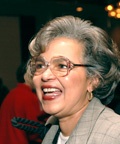Sitting in her office, high above the fresh street construction on Fifth Avenue, Lolita Burnette is just finishing up week number three in a newly created position that could change the way the Portland Development Commission does business.
 Officially, Burnette is the director of community relations and business equity, a position created after a community outcry over the lack of minority-owned business participation on PDC-backed projects. Unofficially, she will champion diversity planning at the PDC.
Officially, Burnette is the director of community relations and business equity, a position created after a community outcry over the lack of minority-owned business participation on PDC-backed projects. Unofficially, she will champion diversity planning at the PDC.
"I'll work on more non-traditional channels to get to people," Burnette says.
To do that, Burnette will have to increase minority and female participation and change internal PDC policies – policies that have been in place for decades. That may sound like a momentous task, but Burnette said the attitude of the development commission, as well as the City Council, seems to be changing.
She points to recent changes made by commission and city leaders – changes they made after being confronted by the African American Alliance – and says the attitude shift, combined with her new position, is like "an alignment of the stars."
Examples of this alignment might include the PDC's recent hiring of a minority-owned firm, F.M. Burch & Associates, to help identify and recruit minority contractors, as well as Executive Director Bruce Warner's recently penned letter, which criticized low minority recruiting on the South Waterfront project.
But Burnette does have some uphill battles — and critics. Roy Jay, president of the African American Chamber of Commerce, said he has heard the hand clapping at PDC before.
"She needs to hit a grand slam homerun," he said of Burnette. While remaining optimistic, Jay also said that Burnette has "yet to contact the African American Chamber of Commerce."
Mike Warwick, land use chair for the Eliot Neighborhood Association, said Burnette's status as a PDC newcomer could be helpful. Warwick said the PDC's history of community outreach isn't as proactive as it could be.
"Somebody who comes in from an outside perspective … I don't think that's necessarily a bad thing," he said.
A National Merit Scholar and Reed College graduate, Burnette has dealt with workforce diversity in the private and public sectors before.
"There is a need to change the system. It's not always that people are bad or racist … they've inherited the system," she said, adding it will take involvement on every level to be "anything more than lip service."
Burnette's accountability strategy, a step-by-step examination of minority and women involvement, relies mainly on an old technique – communication. Burnette's office is forming an advisory committee made up of the many different parties involved; will set up "face-to-face" meetings with different parties; and publish a monthly newsletter examining the different issues surrounding diversity.
Burnette says she also will examine how her initiatives are working with different minority communities. For instance, is the PDC meeting the Latino community's needs? Is the conversation occurring in the right place? What more can be done? These are all questions Burnette wants to have answers for.
One controversial issue Burnette will deal with is the Construction Wage Policy, adopted by the Portland Development Commission in early January. The policy requires companies working on PDC-funded projects of $1 million or more to pay prevailing wages to their workers. Prevailing wage rules are established by the Bureau of Labor and Industries and apply to all publicly funded projects. Many minority and small construction companies have stated their opposition to prevailing wage rules because of the financial burden it places on their payroll.
With an increasingly diverse marketplace, Burnette said there also is a need for the PDC to increase the number of staff familiar with the community – although the PDC staff's ethnicity nearly mirrors Portland's census data.
"We need people to talk to the community," she said. "There is no PDC interpreter."
But with a board of commissioners as diverse as the PDC's, change should be relatively easy, and Burnette says the encouragement is coming from all angles.
"When a group like the African American Alliance (demands change)," she said. "How can you turn your back on that?"
- Home
- News
- Opinion
- Entertainment
- Classified
- About Us
 MLK Breakfast
MLK Breakfast- Community
- Foundation
- Obituaries
- Donate
04-20-2024 3:57 am • PDX and SEA Weather






















































































































































































































































































































